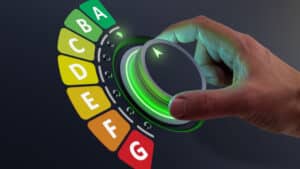Energy Efficiency Tips for Residential HVAC Systems
How to Save Money Starting Now

As homeowners, we’re all constantly looking for ways to improve indoor comfort while minimizing energy costs. And surprise! Your heating, ventilation, and air conditioning (HVAC) system plays a pivotal role in this process. There are more than a few ways you can use to improve the energy efficiency of your residential HVAC system right away. That translates into lower energy bills starting now. Take a look at these ten suggestions to help you optimize your home’s heating and cooling while reducing your carbon footprint and lowering utility bills, bada bing, bada boom!
Regular Maintenance:
We say this a lot in this space, but scheduling an annual HVAC system inspection and regular maintenance by a professional technician will go a long way to saving your equipment and your pocketbook. A qualified pro can inspect, repair and protect your HVAC, identifying and addressing any potential issues before they escalate into costly problems.
Energy-Efficiency Upgrades:
Replacing an outdated HVAC unit with an Energy Star-certified model is a great way to ensure you’ll get maximum savings from your equipment. These newer systems are engineered to consume less energy while working even more effectively to heat and cool your home.
Programmable Thermostats:
Install a programmable thermostat to automate indoor temperatures that reflect your schedule and your unique needs. Programming your thermostat to adjust temperatures during periods when you’re asleep or away from home are an easy, painless way to cut energy consumption without sacrificing indoor comfort.
Seal and Insulate Ducts:
By allowing conditioned air to escape before reaching its destination, leaky ductwork means significant energy loss and an increase in your utility spend. Seal ducts correctly and take care to ensure they are adequately insulated to prevent heat transfer.
Utilize Ceiling Fans:
Ceiling fans improve air circulation and distribution throughout your home when using HVAC. Using a fan, you can maintain indoor comfort at a higher thermostat setting during the summer and while using a lower temp setting in the winter.
Harness the Power of Natural Lighting:
Take advantage of natural light during the day by opening curtains and blinds. This lessens the need for artificial lighting in the winter. In the summertime, shutting window coverings minimizes heat gain, lessening the workload on your air conditioner.
Emphasize Ventilation:
Prevent obstruction of air vents and registers to facilitate unrestricted airflow. This promotes efficient heating and cooling distribution throughout your home, and keeps your HVAC from having to work harder to maintain indoor comfort.
Use Zone Heating and Cooling:
Where applicable, zoning systems can let you create different temperatures in different areas of your home. As you might imagine, these customized comfort settings reduce energy waste by heating or cooling only occupied spaces.
Assess and Improve Home Insulation Levels:
Good insulation keeps indoor temperatures consistent and reduces unwanted energy losses. Get your insulation levels evaluated, including areas like walls, attics, and floors, and then take action if needed. You’ll see results with greater energy efficiency and lower energy bills.
Lower the Heat:
Heat-generating activities and energy draining appliances should not be used during peak heating periods to lessen the burden on your HVAC system. Find ways to utilize more energy-efficient appliances and overall best practices to lower heat output and improve efficiency.
Even adopting just a few of the suggestions above will result in significant savings on energy costs. While many agree “going green” is a priority when it comes to the planet, everybody agrees on “going green” when it comes to more money in your wallet.
Ask our thousands of fans! AirTro is the premiere heating and air conditioning company for the San Gabriel Valley. Call us today for all your heating and air conditioning needs. (626) 357-3535.
